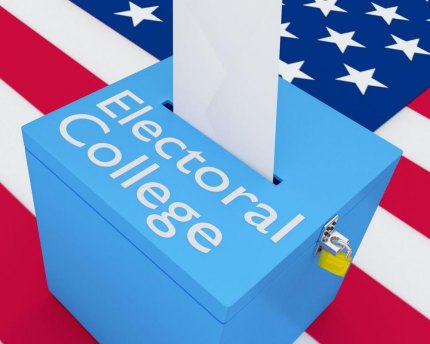
Not withstanding the assertions of Donald Trump, a Republican, that he actually won reelection, the reality is that the Democratic challenger, Joe Biden, was the clear victor. Biden won 81,283,495 votes, and Trump won 74,223,755, according to results reported by The Associated Press.
Four years ago, it was a different story. Then, if the election was simply a matter of counting votes, Hillary Clinton, the Democratic candidate, would have won, with 65,853,516 votes, CNN reported. Republican Trump had 62,984,825 votes. So, why was he the winner? The answer is that he won enough states to guarantee an Electoral College victory. In 2016, he won 306 electoral votes, whereas Clinton won 232 votes.
The Electoral College did not help Trump this time. In fact, the results were apparently reversed: Trump won enough states to take home 232 electoral votes. Biden won 306 electoral votes.
So what is the Electoral College and how does it work? Here are some questions and answers:
Why not just elect a president using the popular vote? During the Constitutional Convention of 1787, the framers "feared that without sufficient information about candidates from outside their state, people would naturally vote for a 'favorite son' from their own state or region. At worst, no president would emerge with a popular majority sufficient to govern the whole country. At best, the choice of president would always be decided by the largest, most populous states with little regard for the smaller ones," explained William C. Kimberling in a 1992 article, The Electoral College on the Federal Election Commission's website.
The textbook, Government By the People by James MacGregor Burns, J.W. Peltason and Thomas E. Cronin (Prentice-Hall Inc.; 1984), explains, “The framers of the Constitution devised the Electoral College system because they wanted the president chosen by electors exercising independent judgment. Subsequent political changes have transformed the electors into straight party representatives who simply register the voters’ decision.”
How does it work? The Constitution spells out that this is how presidents are elected: “Each state shall appoint, in such manner as the legislature thereof may direct, a number of electors, equal to the whole number of senators and representatives to which the state may be entitled in the Congress…”
What are the requirements for becoming an elector? The Constitution is specific about who can’t take the job: “No senator or representative, or person holding an office of trust or profit under the United States shall be appointed an elector.”
The 14th Amendment, approved shortly after the Civil War, takes another step. A person cannot serve as an elector if he or she “engaged in insurrection or rebellion against the same [the U.S.], or given aid or comfort to the enemies thereof. But Congress may by a vote of two-thirds of each House, remove such disability.”
When citizens vote, they vote for one candidate or another. But “the voter technically does not vote directly for a candidate but chooses between slates of presidential electors,” explains Government By the People.
When do the electors vote? Officially, the electors meet in their respective state capitals on the first Monday after the second Wednesday in December. This year, that will happen on Dec. 14.
Number of electoral votes in each state according to the National Archives:
| State | Number of Electoral Votes |
|---|---|
| Alabama | 9 |
| Alaska | 3 |
| Arizona | 11 |
| Arkansas | 6 |
| California | 55 |
| Colorado | 9 |
| Connecticut | 7 |
| Delaware | 3 |
| District of Columbia | 3 |
| Florida | 29 |
| Georgia | 16 |
| Hawaii | 4 |
| Idaho | 4 |
| Illinois | 20 |
| Indiana | 11 |
| Iowa | 6 |
| Kansas | 6 |
| Kentucky | 8 |
| Louisiana | 8 |
| Maine | 4 |
| Maryland | 10 |
| Massachusetts | 11 |
| Michigan | 16 |
| Minnesota | 10 |
| Mississippi | 6 |
| Missouri | 10 |
| Montana | 3 |
| Nebraska | 5 |
| Nevada | 6 |
| New Hampshire | 4 |
| New Jersey | 14 |
| New Mexico | 5 |
| New York | 29 |
| North Carolina | 15 |
| North Dakota | 3 |
| Ohio | 18 |
| Oklahoma | 7 |
| Oregon | 7 |
| Pennsylvania | 20 |
| Rhode Island | 4 |
| South Carolina | 9 |
| South Dakota | 3 |
| Tennessee | 11 |
| Texas | 38 |
| Utah | 6 |
| Vermont | 3 |
| Virginia | 13 |
| Washington | 12 |
| West Virginia | 5 |
| Wisconsin | 10 |
| Wyoming | 3 |
Related:
Why was inauguration day changed?
Counting heads: An election lexicon
If you would like to comment, give us a shout, or like us on Facebook and tell us what you think.